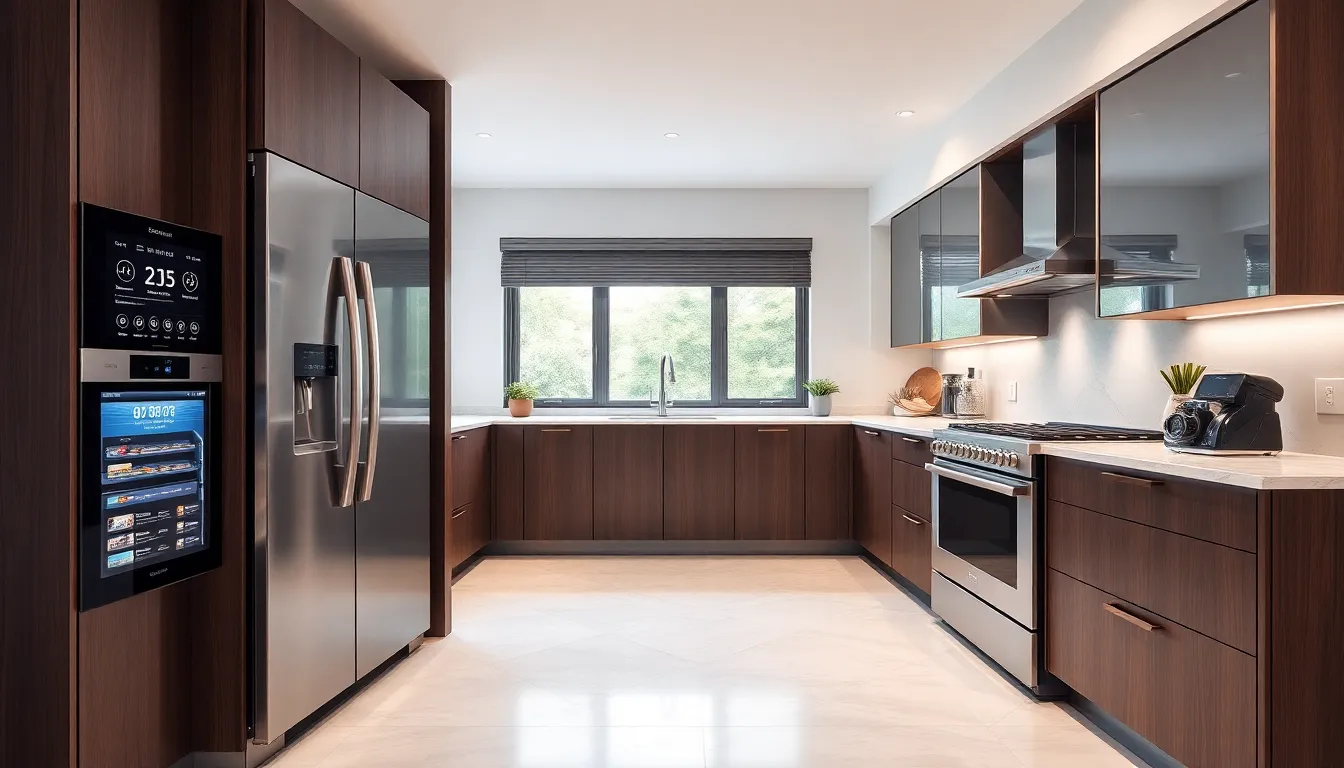Table of Contents
ToggleThe kitchen has evolved into a high-tech haven where innovation meets culinary creativity. As technology advances, homeowners are embracing smart appliances and gadgets that not only enhance cooking efficiency but also elevate the overall kitchen experience. From voice-activated assistants to IoT-enabled refrigerators, the latest trends are reshaping how people prepare meals and manage their kitchens.
Staying ahead of the curve in kitchen technology means understanding these emerging trends. Whether it’s the rise of energy-efficient devices or the integration of AI in meal planning, these advancements are designed to simplify daily tasks and promote sustainability. As the kitchen continues to transform, it’s essential to explore what’s new and how these innovations can make cooking more enjoyable and efficient.
Overview of Kitchen Technology Trends
Kitchen technology trends focus on the integration of advanced appliances and tools that enhance productivity and sustainability. Smart appliances, like voice-activated ovens and app-controlled slow cookers, streamline cooking processes.
Emerging innovations prioritize energy efficiency, with devices designed to reduce energy consumption while maintaining performance. For instance, many modern refrigerators now use smart sensors to optimize cooling, contributing to lower electric bills and reduced waste.
AI integration plays a significant role in meal planning, offering personalized recipe suggestions based on available ingredients. Technologies like meal management apps assist users in tracking groceries and planning meals efficiently. Additionally, IoT-enabled devices create interconnected ecosystems, allowing seamless communication between appliances for a more cohesive cooking experience.
Sustainable practices also influence kitchen trends, with a focus on using eco-friendly materials and reducing food waste. Technologies that support composting and recycling workflows are gaining popularity, reflecting a growing awareness of environmental impact.
Staying current with these trends enables individuals to create smarter, more sustainable kitchens that align with modern lifestyles. By embracing innovation, they can enhance culinary creativity while promoting efficiency and ecological responsibility.
Smart Appliances

Smart appliances transform kitchens into efficient, responsive spaces that enhance the cooking experience. These devices leverage technology to streamline tasks and promote sustainability.
Benefits of Smart Appliances
Smart appliances provide numerous advantages, including increased energy efficiency and time savings. Smart refrigerators monitor food inventory and alert users when items are running low. Smart ovens offer precise cooking settings and can adjust temperatures automatically. Additionally, many smart appliances improve meal planning by suggesting recipes based on available ingredients, minimizing food waste. These benefits not only enhance convenience but also contribute to a more sustainable kitchen environment.
Integration with Home Automation
Smart appliances integrate seamlessly with home automation systems, promoting a connected lifestyle. Devices can communicate with each other, enabling users to control them via smartphones or voice-activated assistants. For instance, a user can preheat the oven while grocery shopping or monitor the refrigerator’s contents from work. This integration simplifies meal preparation and encourages efficient use of resources, aligning with modern energy-saving goals.
Sustainable Kitchen Innovations
Sustainable kitchen innovations focus on minimizing environmental impact while enhancing functionality. The integration of eco-friendly materials and energy-efficient technologies plays a crucial role in transforming kitchen spaces into sustainable environments.
Eco-Friendly Materials
Sustainable kitchen designs prioritize eco-friendly materials that reduce the carbon footprint. Bamboo countertops offer a renewable and durable option, while recycled glass tiles provide a stylish, low-impact backsplash. Cabinets crafted from reclaimed wood not only conserve resources but also add unique character to kitchens. Additionally, low-VOC paints contribute to healthier indoor air quality, making them ideal for kitchen spaces. Sourcing materials with sustainability certifications, such as FSC (Forest Stewardship Council), ensures responsible production practices.
Energy-Efficient Technologies
Energy-efficient technologies significantly reduce energy consumption in the kitchen. Induction cooktops use magnetic fields to heat pots and pans directly, offering faster cooking times while using less energy. Energy Star-certified appliances, such as refrigerators and dishwashers, consume less power without sacrificing performance. Smart thermostats and energy monitors help optimize energy use, providing insights into usage patterns and costs. Implementing LED lighting fixtures contributes to reduced energy consumption and longer lifespan compared to traditional lighting. By adopting these technologies, households can achieve considerable savings on energy bills and minimize their environmental footprint.
Food Preparation Innovations
Innovations in food preparation are reshaping kitchen dynamics, making meal preparation more efficient and enjoyable. High-tech cooking gadgets and advanced food preservation methods play pivotal roles in this transformation.
High-Tech Cooking Gadgets
High-tech cooking gadgets enhance culinary experiences and streamline food preparation. Smart pressure cookers offer programmable settings, allowing precise control over cooking times for various recipes. Sous-vide devices enable precise temperature management, ensuring perfectly cooked meals. Multi-cookers combine several appliances into one, providing versatility for pressure cooking, slow cooking, and sautéing.
Another popular gadget, smart blenders, feature touch controls and pre-set programs, simplifying smoothie and soup creation. Furthermore, wireless meat thermometers deliver real-time cooking data directly to smartphones, ensuring optimal doneness. These advancements not only reduce preparation time but also improve cooking accuracy.
Advanced Food Preservation Methods
Advanced food preservation methods promote longer shelf lives and reduce waste. Vacuum sealers remove air from food packaging, significantly extending freshness and preventing freezer burn. Intelligent refrigeration systems monitor temperature and humidity, automatically adjusting settings to preserve stored items effectively.
Fermentation kits capitalize on probiotics to enhance flavor and nutrition while extending food life. Additionally, smart jars equipped with sensors alert users when produce nears spoilage, enabling timely consumption or preservation. Such innovations empower home cooks to minimize waste and extend the lifespan of ingredients, aligning with sustainable kitchen practices.
Digital Cooking Solutions
Digital cooking solutions significantly enhance culinary experiences, enabling home cooks to streamline meal preparation and explore diverse cuisines. Key technologies include intuitive apps and online classes that promote efficiency and creativity in the kitchen.
Recipe and Meal Planning Apps
Recipe and meal planning apps centralize grocery lists and meal ideas, making cooking more organized and enjoyable. These apps often feature:
- Personalized suggestions based on dietary preferences and available ingredients.
- Step-by-step instructions that guide users through complex recipes with ease.
- Ingredient tracking capabilities that remind users when items are nearing expiration, reducing food waste.
Popular examples include Yummly and Paprika, which offer extensive databases and user-friendly interfaces that cater to various cooking skill levels.
Virtual Cooking Classes
Virtual cooking classes provide interactive learning opportunities, allowing users to hone their culinary skills from home. Benefits include:
- Real-time instruction from professional chefs and culinary experts, facilitating immediate feedback.
- Diverse cuisine offerings that inspire users to experiment with new flavors and techniques.
- Community engagement through forums and group classes, fostering social connections among cooking enthusiasts.
Platforms like MasterClass and Sur La Table offer a wide range of classes, catering to varying interests and skill sets, enhancing the overall cooking experience.
The evolution of kitchen technology is revolutionizing how people cook and interact with their culinary spaces. By embracing smart appliances and sustainable innovations, households can enhance efficiency while minimizing their environmental impact.
As technology continues to advance, the integration of AI and IoT will further streamline meal preparation and promote resource conservation. The emergence of eco-friendly materials and energy-efficient devices reflects a growing commitment to sustainability in kitchen design.
Staying informed about these trends not only enhances culinary creativity but also fosters a more responsible approach to cooking. Embracing these innovations will empower home cooks to create efficient and enjoyable kitchen experiences for years to come.




